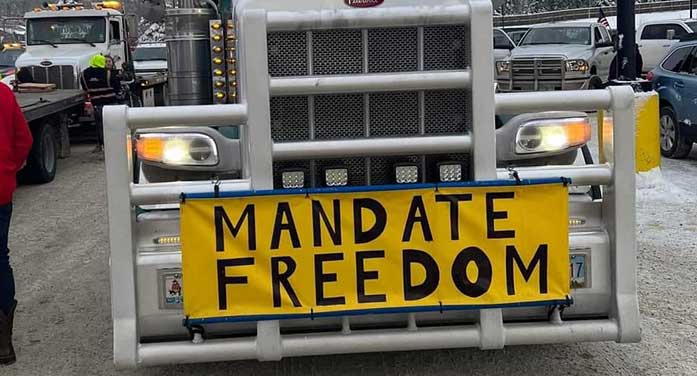 The Freedom Convoy has dominated the domestic and international news cycle for nearly three weeks. The protest is in the process of coming to a stunning conclusion, based on Prime Minister Justin Trudeau’s decision to invoke the Emergencies Act on Monday.
The Freedom Convoy has dominated the domestic and international news cycle for nearly three weeks. The protest is in the process of coming to a stunning conclusion, based on Prime Minister Justin Trudeau’s decision to invoke the Emergencies Act on Monday.
Things were gradually winding down in recent days.
Protesters were removed from the Ambassador Bridge in Windsor, Ont. last weekend by local police, Ontario Provincial Police and the RCMP. Roughly 25 to 30 people were arrested in a fairly peaceful fashion. The busiest point of cross-border trade between Canada and the U.S. was successfully reopened.
The Pacific Highway Border Crossing between Blaine, Wash., and Surrey, B.C. remains closed, but that blockade seems to be slowly drawing to a conclusion. Surrey RCMP arrested four protesters near the crossing on mischief charges last weekend.
There was also some activity at the border crossing between Sweet Grass, Mont., and Coutts, Alta. The Mounties issued dozens of tickets at the blockade over the weekend. And the RCMP arrested 11 people on Monday and seized 13 long guns, handguns, body armour, a machete, ammunition and high-capacity magazines.
The major sticking point was in Ottawa.
While the number of protesters in the city has decreased, there are still trucks, cars and other vehicles around Parliament Hill, the downtown core and residential areas. Ottawa Mayor Jim Watson released a letter on Feb. 12 asking organizers to “remove your convoy and its trucks from all of our residential neighbourhoods and that you restrict your presence to a limited perimeter from Wellington Street where it meets Elgin Street and to the Sir John A. Macdonald Parkway.”
The mayor’s office also released a Feb. 12 response from Freedom Convoy president Tamara Lich. She wrote, “The Freedom Convoy Board agree with your request to reduce pressure on the residents and businesses in the City of Ottawa. We have made a plan to consolidate our protest efforts around Parliament Hill. We will be working hard over the next 24 hours to get buy in from the truckers. We hope to start repositioning our trucks on Monday.”
As of the writing of this column, the arrangement hadn’t moved forward.
And that brings us to Trudeau. The PM announced he was going to invoke the Emergencies Act, a strategy he had ducked, dodged and avoided until now.
The media correctly noted the Emergencies Act had never been previously used – with a caveat. In July 1988, this act replaced the War Measures Act, which, in a subtle twist of irony, his father, Pierre Elliott Trudeau, invoked during the FLQ crisis in October 1970.
Like father, like son, like Trudeau.
What does the Emergencies Act entail?
“For the purposes of this Act,” according to Section 3, “a national emergency is an urgent and critical situation of a temporary nature that (a) seriously endangers the lives, health or safety of Canadians and is of such proportions or nature as to exceed the capacity or authority of a province to deal with it, or (b) seriously threatens the ability of the Government of Canada to preserve the sovereignty, security and territorial integrity of Canada and that cannot be effectively dealt with under any other law of Canada.”
The Emergencies Act contains two differences from the War Measures Act. First, the cabinet’s decision to declare a national emergency must be reviewed by Parliament. Second, all temporary laws constructed from the parliamentary-approved national emergency are subject to the Charter of Rights and Freedoms.
Regardless, this was a poor decision by a weak, ineffective prime minister on the last legs of his mediocre leadership.
The Freedom Convoy has been a peaceful protest, for the most part. It was organized due to frustration over Trudeau’s decision to impose vaccine mandates on truckers and other essential workers – even though most are fully vaccinated. The participants, composed of truckers and many other average citizens, came from all parts of Canada and represented all walks of life. They stood for the cherished principle of freedom and opposed the litany of government restrictions and lockdown measures during COVID-19.
The protest hasn’t been perfect. Some bad elements reared their ugly heads with different personal visions and political motivations. That’s the case with virtually all protests throughout history. Our friends on the political left, who have organized many of them, surely know this.
Trudeau has set a horrendous precedent by invoking the Emergencies Act. He didn’t need to do it. He’s unnecessarily overextended his government’s decision-making powers, albeit temporarily. He’s weakened the institution of government. He’s put an arrow through the heart of our democracy, liberty and freedom.
Happy Valentine’s Day … not.
Michael Taube, a Troy Media syndicated columnist and Washington Times contributor, was a speechwriter for former prime minister Stephen Harper. He holds a master’s degree in comparative politics from the London School of Economics. For interview requests, click here.
The opinions expressed by our columnists and contributors are theirs alone and do not inherently or expressly reflect the views of our publication.
© Troy Media
Troy Media is an editorial content provider to media outlets and its own hosted community news outlets across Canada.

